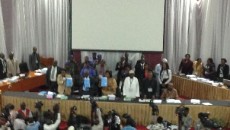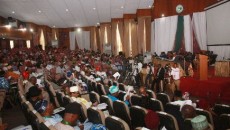For the avoidance of doubt, the battle around so-called fuel subsidy, reignited by the recommendation of the committee on public finance of the National Conference 2014, is in reality a battle over several fundamental issues that define a particular terrain of the class struggle between the ruling and subordinate classes in our society.
Let us take the arguments of the proponents of removal of the subsidy one by one: First, they say the subsidy bill is burden on the Federation account and undermines the ability of the state to fund development because it takes up between 30 and 40% of the national budget.
This is absolutely true, but it explains nothing. The assertion fails to explain why the subsidy bill has grown exponentially from under N400bn in 2005 to about N600bn in 2010, and the scandalous bill of N2.5tn in 2011. Nor does it explain how after the experience of the January Uprising of 2012, that same bill dropped to about N1.3tn in 2012, and dipped below N1.2tn in 2013. Correspondingly it also fails to explain why the amount of imported refined fuel for daily consumption, skyrocked from less than 30 million litres per day in 2010 to 60 million litres per day in 2011, and then dropped to 40 million litres per day in 2012 and 38 million litres per day in 2013!
The reason for these gyrations in daily consumption rates and the consequent gyrations in the subsidy bill is simply because these figures are not scientifically determined figures, have no bearing with actual reality, but have just been arrived at through the corruption mediated interactionS between the managers of the sector, political office holders, and the oil cabal at the heart of the refined products importation regime.
Fraudulent and corrupt practices aided and abetted by officials of the state and its relevant MDAs, including such practices as round tripping, over invoicing, claiming subsidy for ghost products, and getting paid for demurrage that ought not to have been in the first place; all of these are at the heart of the corruption that has characterized the management of the subsidy regime.
The question to ask is how is it possible for all of these to be happening and to be known, and yet no one has been jailed, and no one has lost their jobs, and as well no monies have been refunded? The only logical conclusion that can be drawn is that this empire of sleaze enjoys state protection. If this is so, this then becomes a failure of the state and its institutions, and a failure of governance, and as such ought to be tackled as a battle against criminality, not as a war against the poor to make life more miserable for the more than 70% of our citizens who live in poverty, through astronomical, and incessant increases in the price of fuel and its consequent deleterious impact on inflation, cost of living, and unemployment situations in the country.
A second argument is that the subsidy does not benefit the poor, and that the super-rich benefit disproportionately. Part of the argument for this is that the product is sold at far higher than the subsidized price in many places across the country. The reasoning is that if subsidy is removed everyone will now pay the same price across the country. Again this is a fallacious argument. There is in existence a petroleum products equalization fund Act, that established an equalization fund, from which marketers benefit to cover logistics cost in order to ensure that the product is sold at the same price across the country. The scheme is funded through a surcharge on every litre of fuel or product bought. The problem is that although this surcharge has been dutifully collected, and marketers get the necessary bridging funds from this scheme, nevertheless they turn round to sell the products at more than the official price even after benefiting from the fund. This is clear cut case of criminality, which ought to be tackled and addressed as such. It is also another manifestation of the failure of the state and of governance; a collective failure of the ruling class in general.
Haven said this it is however important to state very clearly that the removal of the so-called subsidy will not lead to equalization of prices across the country; in fact the price in the rural and remote places will simply go up by the same factor that prices in the cities would have gone up. The problem is not with the subsidy, it is with the sharp practices of marketers and of officials who are supposed to enforce the law and regulate the sector, as well as with the inadequate nature of the infrastructure for distribution of the products.
Our argument has always been that governance failure and the complicity of the state with criminality and criminal breach of laws and the constitution are significant parts of the problems that require being addressed.
Now, let us turn to the question of why there is a subsidy in the first place. The subsidy exist because we import refined products [the only member state of OPEC to rely on importation of refined products to meet its domestic needs]; and also because the Naira is floated against the dollar which is the currency in which the refining and transportation is costed. Thus as long as we continue to import refined products, and the naira keeps depreciating against the dollar for so long will the price of the product continue to rise. So if subsidy is removed, the price of the product will keep rising in significant proportions almost every month. The consequence of such is that the product will become absolutely unaffordable, become priced out of reach of ordinary citizens, or the state will be forced to keep intervening to keep stabilize prices and prevent social unrest, and thus continue to incur new subsidy bills.
The reason why we rely on importation is because our refineries are comatose inspite of the tens of billions of dollars already spent on Turn Around Maintenances of the refineries, which turned nothing around other than the pockets and savings accounts of the fraudsters who have undermined the processes. So again corruption aided by state officials has deprived us of having the necessary domestic refining capacity that can put a definitive end to the necessity for importation, and therefore of subsidy.
The solution therefore lies not in the removal of subsidy, but in the creation of the enabling environment to ensure that we acquire adequate domestic refining capacity. This could entail both public and private sector investment in refineries.
And herein lies the huge problem, the most significant indication of the collective ineptitude of this treasury looting ruling class, and the most obvious manifestation of their preference of pillage of our wealth over national interest.
Enter the National Conference and the recommendation of its committee on Public Finance for the total removal of oil subsidy without addressing the structural problems and criminality in the sector. With their recommendation, the battle line became drawn between the ruling and subordinate classes. The joint delegation of labour and civil society organisations and their allies entered the battle, and intervened with their motion.
The motion essentially contained the offer made to government, but which the government rejected at the height of the January Uprising.
The summary of the position, captured in the motion requires a period of 3 years during which conditions will be put in place to acquire adequate domestic refining capacity and hence end the necessity for importation; tackle the corruption and criminality in the sector, by prosecuting and jailing offenders and recovering stolen funds; and also ensuring that the equalization fund act is enforced and those found in breach punished. The motion also called for the deployment of appropriate and already existing and available technology to determining accurately the daily consumption needs for petroleum products.
This position and motion eventually became the basis of a second compromise motion, which was carried on condition that it included the prayers of the original motion.
Why was it important for the labour and civil society coalition at the National Conference to engage the ruling class in this battle? This is because of the essential character and significance of the product within the national economy. Given the epileptic state of public power supply, and the fact that almost 80% of power/energy required by households, businesses and industry in both formal and informal sector is self-generated; given that more than 90% of small and medium scale businesses and households depend on petrol powered generators to generate their own energy; and given the high poverty rate at 70% and unemployment rate at 30% in the population; it is of utmost economic, social and political importance and significance that the product should not only be available, but that it should also be affordable and accessible. The alternative will be economic collapse and chaos.
Finally there is the need to comment briefly on the last minute manourvers by certain elements which nearly prevented victory, and ultimately tried to undermine the significance of the victory so won. The so-called compromise motion sponsored by certain individuals at the last minute, which although was in reality a re-writing of the original motion by the labour-civil society platform, which tried to water down the pungency of the original demands and prayers, which sort to supplant the original motion, and which was thrust on delegates almost at the last minute, very nearly cost us the victory.
This is so because while this new motion carried a neutral title, it was sponsored by certain individuals, not part of the labour-civil society bloc, included the names of civil society delegates as sponsors, and also excluded the names of labour delegates as sponsors.
Two very critical things were wrong with this approach; first it is capable of undermining the trust between the labour and civil society partners in the bloc; and secondly it ceded the strategic positioning of the labour-civil society bloc, as the primary and core platform for defending the interests of the popular masses to those who can be described at best as fair weather friends.
For instance the new motion rather than the original motion has gone into the records as the primary motion; the role played by and the significance of the labour-civil society bloc, is subsumed as mere appendage to the last minute posturings of others. And just as with the June 12 struggle we now risk a situation where the history of this battle will be rewritten, and the leadership and central role played by the bloc will be subordinated to the mythical role of a few individuals of the ruling elites.
If there is one lesson taught and reinforced by this battle and victory, it is that even the ruling class and elements of the ruling elites recognize the power and pungency of the popular movement represented by this labour-civil society Bloc; that because of this recognition on their part, they will always seek to curtail, or co-opt our movement and platform, in order to deflect from its pungency and lay the basis for future historical distortions.
It is up to us to safe-guard our alliance, and to prevent ourselves from pandering to the camouflaged interests of elite forces.
For the avoidance of doubt, what changed the tide was the reasoned and articulated intervention of the Labour-Civil Society Bloc, articulated in the Original Motion titled; ‘Motion by Joint Labour and Civil Society Delegation and their Allies on Petroleum Subsidy Removal’. This motion was in circulation before the beginning of consideration of the report, it was well received, and it was in the popular domain more than 24 hours before the new motion which although paraphrased the original, nevertheless sought to supplant it.
To conclude, the battle over fuel prices; whether it should be affordable or not; whether it should be accessible or not; and the conditions under which we can achieve both affordability and accessibility; is a concrete manifestation of our decision and determination to engage the battle with the ruling class on the terrain of this National Conference.
If we were not there, they would have passed the recommendation and endorsed hiking of prices without tackling the social and economic malaise at its root.



